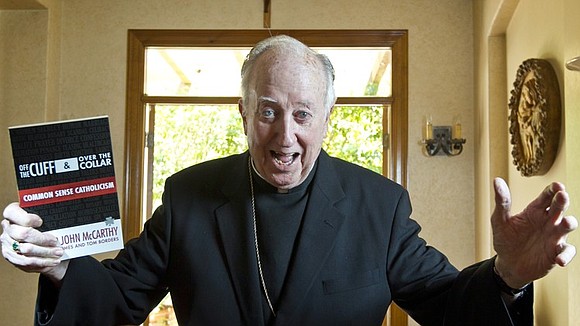Catholics in the pews, unleash your anger
CNN/Stylemagazine.com Newswire | 8/21/2018, 11:57 a.m.
By Paul Begala
(CNN) -- Bishop John McCarthy of Austin will be laid to rest Friday. A larger-than-life, gregarious Irishman, McCarthy led the Catholic Diocese of Austin from 1986 until 2001, and was a priest for more than 60 years.
He was powerfully committed to civil rights (not always popular in the Texas in which he grew up), questioned the church's tradition of priestly celibacy, and advocated for a more inclusive and powerful role for women. The diocese thrived under his leadership. Enrollment in Catholic schools, membership in the church, baptisms, and conversions more than doubled, the diocese said.
I first met Bishop McCarthy when he was an auxiliary bishop in Houston and I was a teenager active in the Catholic Youth Organization (CYO). In the 90's, when he was Bishop of Austin and I was living there, we had regular lunches, where we talked about politics (which he loved), movies, books, and -- as we say in Texas -- life its ownself.
I remember one conversation in the mid 90's especially. A lawsuit had been filed in Dallas, alleging that a priest had molested children and the church had covered it up. It was one of the first such lawsuits in the country. I recall being shocked, and disbelieving that such a thing could happen. Not in the church that had given me a moral compass and spiritual sustenance; the institution that sponsored dances and retreats and even found a spot on the Holy Family CYO basketball team for a kid who was too short and too slow for the high school team.
I was then -- and remain today -- an active member of the Catholic Church, and had never even heard a murmur about abuse. But Bishop McCarthy told me that my blissful, blessed experience was not everyone's. He had fought in 1987 to defrock an abusive priest, and knew well the resistance many in the hierarchy had to addressing the abuse scandal.
He told me about numerous bishops back east who had asked him to accept priests who had been "cured" of child molestation. He refused. They implored him, he said, even saying he was being un-Christian by not forgiving the priests' sins and accepting their redemption.
The bishop scoffed at the notion. His diocese was far-flung, covering 25 counties; he knew he could not sit in Austin and supervise a "former" child molester 130 miles away. So he resisted. He refused to be part of the priest abuse pipeline. God only knows how many Texas children he saved from abuse.
Pope Francis' letter reacting to the shocking, heartbreaking report from Pennsylvania, in which more than 1,000 children were allegedly abused by over 300 priests, is necessary but not sufficient.
The Holy Father rightly acknowledges the staggering toll and the church's culpability. "Looking back to the past," he wrote, "no effort to beg pardon and to seek to repair the harm done will ever be sufficient. Looking ahead to the future, no effort must be spared to create a culture able to prevent such situations from happening, but also to prevent the possibility of their being covered up and perpetuated."
The pontiff called for prayer and penance, fasting by the faithful, and decried a culture of clericalism, which he said "helps to perpetuate many of the evils that we are condemning today. To say 'no' to abuse is to say an emphatic 'no' to all forms of clericalism."
The solution, it seems to me, must come from inside the Church but outside the clergy. We lay Catholics are taught from earliest childhood to -- in the words of the old saying-- "Pray, pay and obey." No more.
Father James Martin, the Jesuit writer on all things Catholic and a consultant to the Vatican's Secretariat for Communications, communicated this clearly. In a recent op-ed in the New York Times, Martin roused the faithful, exhorting lay Catholics to "Speak to your pastor, write to your bishop, express your anger to the Vatican's nuncio in this country. Most of all, work in any way that you can for real change, even at the cost of being seen as a troublemaker."
Reformers from outside the priesthood -- especially women -- must be empowered. After the clergy abuse revelations of the early 2000's, the Catholic Church in America appointed a lay-controlled National Review Board. Its chair, then-Oklahoma Gov. Frank Keating, is a former FBI agent. He described the behavior of the bishops and others in positions of authority -- resisting subpoenas, refusing to reveal the names of rapists, denying the extent of the scandal -- as akin to the conduct of the Mafia. He resigned from the panel, saying, "My remarks, which some bishops found offensive, were deadly accurate. I make no apology."
In an interview this week with Rod Dreher of The American Conservative, Keating, himself a conservative Republican, remained unapologetic. Noting the revelation that Washington Cardinal Theodore McCarrick faces allegations ("credible and substantiated" said church officials) of abuse of a minor, Keating said, "Surely people knew about it, but no one talked. That was the cosa nostra, not my church. I found that incredible that that could occur. Priests that were misbehaving were outed, but not bishops, not the cardinal? That's hypocrisy at its worst level."
Like so many Catholics, I am reeling. I am praying that Pope Francis will institute reforms with teeth -- yet I also believe that the Church is the People of Christ, and so the laity must lead. One lesson from the Pennsylvania report is, there are not enough Bishop McCarthys, sadly. But there are a lot of Frank Keatings.
The amount of power vested in lay reformers will tell us how serious the church is about truly addressing the scandal.










